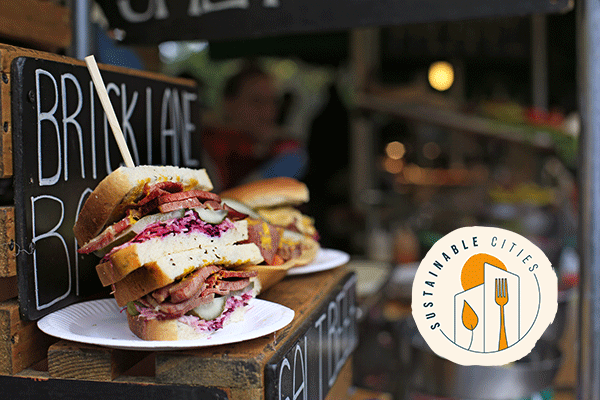![]() This article is part of a new series by Wicked Leeks, Sustainable Cities, exploring what sustainable food means to those living in the city.
This article is part of a new series by Wicked Leeks, Sustainable Cities, exploring what sustainable food means to those living in the city.
We all have to eat regardless of whether we live on a croft in the Scottish Highlands or in a flat in Tower Hamlets. Surely food is the umbilical cord connecting everyone with the land? Nope.
Food and farming are often mentioned in the same sentence. Every year the BBC hosts its celebrated Food and Farming Awards where chefs share the stage with farmers and growers. It’s a beautiful image to see these two worlds presented as so intertwined: like players on the same team lifting a trophy together.
But it’s true only for certain types of farms and certain types of chefs. Some farmers, the minority, sell direct to restaurants, butchers and bakeries and I’m sure some food retailers, the minority, are on first name terms with their farmer suppliers and exchange Christmas cards.
The UK’s 1,000 farm shops are a cosy shop window for British agriculture and give the warming impression of the interconnectedness of food and farming. It’s real, for sure, but it’s not the whole picture, far from it. In fact, food and farming can be worlds apart, and the urban/rural divide is one reason for the gulf. A connection to food does not automatically mean a connection to farming.
I’m yet to meet anyone else from a rural and agricultural background in my Bristol inner-city neighbourhood. From my house I can see terraced houses, cars, scaffolding, TV aerials and telegraph poles. We don’t have a garden – just a small backyard paved with concrete slabs, a shed for our bikes and some rather sad-looking potted plants which Lucy nibbled as a puppy.
Farming and the countryside feel very far away – yet food culture in this deeply urban area is flourishing. There’s a wholefood deli and artisan bakery just a two-minute walk up the street. I can explore the cuisines of India, Poland, Somalia, China, Thailand, Italy, Latin America and the Caribbean all within a square mile of my house.
I can eat organic, free range, vegetarian, vegan, or gluten-free every day of the week and without much effort. You don’t need fields and farms to find good food suiting every waste and diet. For me and most of the 67 million people living in the UK today, our main connection to farming is through the food we choose to buy in the shops. The food that fits with our wallet, our tastebuds and, if we’re lucky enough to afford it, the food that fits with our ethics.

What we choose to eat may help us develop an opinion about farming, but a connection to farming? Not really.
You can love food and call yourself a ‘foodie’ and know absolutely nothing about, or have little interest in, how it was produced.
I use my partner Alex as the perfect example. He absolutely adores a street food market. Alex’s happy place is chowing down on a £10 burger grilled in a converted VW camper van by a tattooed hipster with a beard. Chuck in a craft ale pulled out of a stainless-steel vat from a microbrewery on an industrial estate and he’s in heaven.
Jerk chicken, pulled pork, wood-fired pizzas, ribs, pork belly, beef brisket – if it’s a ‘food experience’ he’ll pay whatever price is written on the chalk board, no questions asked. A couple of years ago he could barely contain his excitement when Burger Bear came to Bristol, a Peckham-based business serving street food out of a graffitied van.
Alex and his mates sat cross-legged on the ground, in the car park of a roof tile factory, eating ‘Grizzly Burgers’ smothered with oak-smoked bacon and sticky bacon jam on brioche buns.
He remembers the ingredients, even put it on Instagram, but at no point did he ask where the beef was from, wonder how it was reared or give a moment’s conscious thought to the fact his beef burger was once a cow, on a farm. Bears were probably closer to mind than cattle.
Alex wasn’t thinking about ‘food and farming’; he was thinking about food. In fact, before we met, farming never crossed his mind.
He didn’t read labels on packets of meat in the supermarket, or even notice whether it was free range, organic or Red Tractor. He’s never asked a restaurant where their ingredients are sourced from. Alex, like millions of consumers, values taste and affordability.
He’ll shop on price for the weekly staples and spend more, a lot more, on treats or ‘food experiences’, like his Grizzly Burger. I am not judging him, nor am I some kind of ethical food archangel sent to show him the error of his ways and set him on the righteous path to food provenance. I am in no place to judge.
For all my pontificating to poor Alex about buying British free range chicken and outdoor-reared pork, I don’t ask our local curry house where the chicken is from in my Friday-night dhansak, and I won’t let my reservations about intensive, indoor pig production stand between me and a pepperoni pizza. I live in a giant glasshouse wielding a massive rock. Like most perfectly normal, well-meaning consumers – I am a big fat hypocrite.
Food is not the conjoined twin of farming. For most consumers food is a best friend we see every day and farming is a distant, long lost cousin we haven’t heard from in years.
Divide: The Relationship Crisis Between Town and Country by Anna Jones is (£16.99, Kyle Books) is out now.















0 Comments